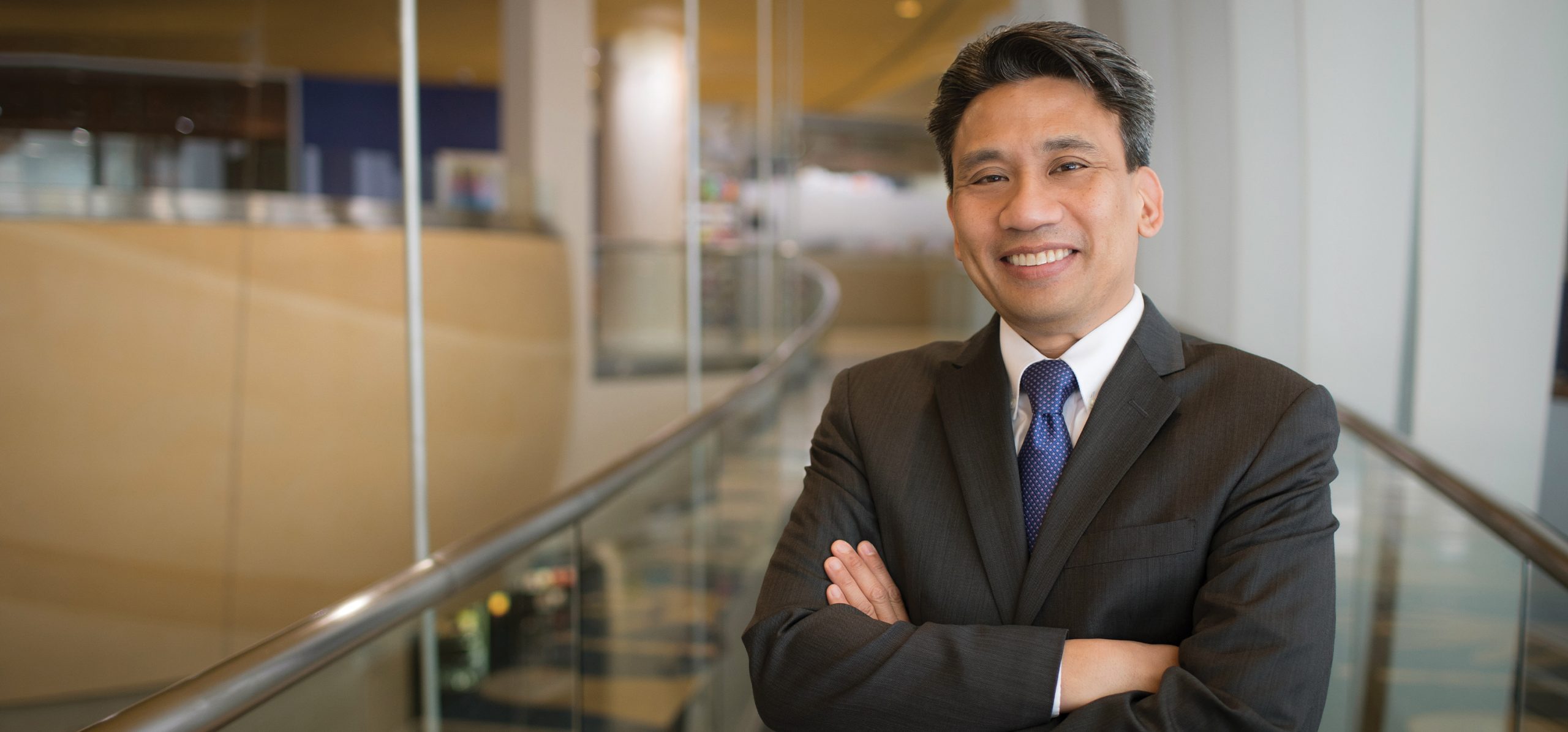
Michael deCastro Cabana, M.D., M.P.H., is a professor of pediatrics and the Michael I. Cohen, M.D., University Chair of Pediatrics at Einstein, and the physician in chief at the Children’s Hospital at Montefiore (CHAM). A native of Illinois, he earned a medical degree from the Perelman School of Medicine at the University of Pennsylvania and a master’s degree in public policy and management at Penn’s Wharton School. He came to Einstein and Montefiore in 2019 after 14 years at the University of California, San Francisco.
Pediatrics seems to be part of your family genome.
Yes, both of my parents are retired general pediatricians. They came to the United States in the 1960s from the Philippines for their residencies. They planned to return but decided to remain in the United States because of the political instability in the Philippines at the time. One of my brothers is a pediatric dentist and the other is a pediatrician who is also married to a pediatrician. Another brother works as an executive producer in the entertainment industry—but we love him anyway.
Why, during medical school, did you take time out to earn a master’s degree in public policy?
This was in the early ’90s, after President Bill Clinton proposed the Health Security Act, which would have guaranteed healthcare for all Americans. It was an exciting time in health policy. I thought it would be beneficial to gain a different view of healthcare, especially from a graduate program taught at a business school.
Why did you come to Einstein and Montefiore?
One reason was the people. As an asthma researcher, I’d worked with a number of great investigators here. I also liked that CHAM is a hospital within a hospital, which would provide opportunities for me to collaborate with people from other disciplines who could offer new ideas. A third reason is the institution’s commitment to social justice. I remember, back when I was in medical school, hearing about Montefiore’s pioneering residency programs in social medicine and social pediatrics, and I wanted to be part of them. I was also impressed with the institution’s resilience and ability to innovate, creating school health programs and developing its own base of primary-care providers.
What aspect of the job has surprised or challenged you the most?
I arrived just before COVID-19 hit, so early on I spent a good amount of time trying to separate pandemic from nonpandemic challenges. Probably the biggest surprises were the scale of things—the size of the healthcare network at Einstein and Montefiore—and the many different relationships with other providers and community institutions.
As the Bronx’s major health provider, we have an obligation to address the community’s wider needs and take a broader view of children’s health.
— Dr. Michael deCastro Cabana
Tell us about your asthma studies.
I started studying asthma in the late ’90s as a Robert Wood Johnson Foundation Clinical Scholar [at Johns Hopkins]. The National Heart, Lung, and Blood Institute had issued guidelines for treating asthma, but few physicians were following them—and trying to understand why they weren’t being followed became a theme of my research. I’ve also studied ways to prevent asthma, such as using probiotics as an infant supplement. More recently, I’ve been leading a study, funded by the Agency for Healthcare Research and Quality, that tests new pediatric quality measures for asthma and sickle-cell disease. By understanding how to refine and apply these measures, we can improve care and outcomes for children with these conditions.
What are your department’s most pressing challenges?
In the short term, we have to fill several key leadership positions, a task that has been slowed by the pandemic. Another challenge is making sure that CHAM is prepared for a continuing evolution and advances in care. Children will be hospitalized less often, with beds reserved for the most acutely ill. We need to expand our neonatal and pediatric intensive care units at the same time, and we need more inpatient psychiatric beds to address a rise in mental health issues among the young, especially here in the Bronx. As a network, we need to provide easily accessible pediatric subspecialty and primary care, especially for children with chronic conditions.
In the past, you’ve noted that good pediatric care isn’t enough to address community health. Could you elaborate?
Good healthcare is clearly necessary but not sufficient. So many other factors affect a child’s well-being, starting with prenatal care for the mother, plus good housing, proper nutrition, safe neighborhoods, and a healthy environment. That’s true everywhere, but especially in the Bronx, with its unusually high infant mortality and poverty rates and other issues. As the Bronx’s major health provider, we have an obligation to address the community’s wider needs and take a broader view of children’s health.
How are you addressing these needs?
Through our primary-care clinics. In addition to traditional clinical care, we provide supportive services to screen and address our patients’ economic and social needs. We’re also exploring innovative technologies, such as a smartphone app developed by Kevin Fiori [M.D., M.P.H., associate professor of pediatrics and of family and social medicine and an attending physician at the Montefiore Medical Group Pediatric Practice], which community health workers can use to connect parents with local health resources. We’re also working with the Bronx Community Health Leaders program to help underrepresented students pursue careers in medicine. Having physicians from the same communities as the patients they serve can help build connections and improve care.
Will the pandemic have a long-term impact on children’s health?
It’s hard to say. There has been a drop in vaccinations among younger kids, and fewer opportunities for socialization during critical years of development. Older children have missed so many rites of passage, like proms and graduations. I’m optimistic; pediatricians are optimists by nature. Kids are resilient. But we’ll have to keep an eye on the long-term effects of the pandemic.